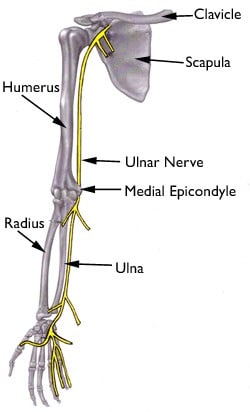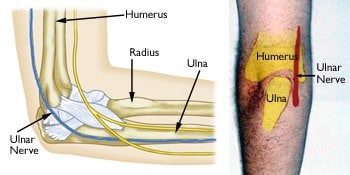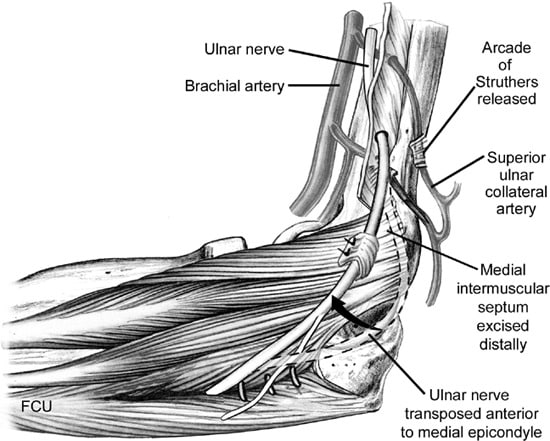Serving Wappingers Falls, Beacon, Lagrangeville, Brewster, Carmel & Nearby Areas Of Hudson Valley
If you've suffered a cubital tunnel injury in Fishkill, NY, you're not alone. This painful and debilitating condition can significantly impact your daily life, career, and overall well-being. At Maurer Law Firm PLLC, we are here to help you navigate the legal challenges that come with such an injury.
Led by Attorney Ira M. Maurer, a nationally recognized trial lawyer with over 40 years of experience, our firm has recovered more than $100 million for injured clients. Known for his technical expertise and deep understanding of complicated medical issues, Attorney Maurer provides the skill and dedication needed to secure fair compensation for those who have been wronged.
Anatomy of the Elbow
The ulnar nerve passes through a tissue tunnel in the elbow called the cubital tunnel, located beneath a bony bump on the inside of the elbow known as the medial epicondyle. This area, often referred to as the "funny bone," is where the nerve lies close to the skin. A slight bump to this spot can result in a shock-like sensation due to the nerve’s sensitivity.
After leaving the elbow, the ulnar nerve moves under the forearm muscles and enters the hand through Guyon’s canal, located at the palm’s base. It is crucial for sensing touch in the little and ring fingers and for controlling both delicate hand movements and the larger forearm muscles involved in gripping.

What is a Cubital Tunnel Injury?
Cubital tunnel syndrome is a condition caused by pressure on the ulnar nerve, which travels from the neck through the shoulder and arm into the hand. Ulnar nerve entrapment occurs when the ulnar nerve in the arm becomes compressed or irritated. The ulnar nerve is one of the three main nerves in your arm. It travels from your neck down into your hand, and can be constricted in several places along the way.

Depending upon where it occurs, this pressure on the nerve can cause numbness or pain in your elbow, hand, wrist, or fingers. Compression can occur in several areas:
- Behind the elbow – The most commonly impacted location, where the ulnar nerve traverses the cubital tunnel near the elbow. Repetitive elbow bending, prolonged pressure, or trauma can cause swelling or irritation.
- At the wrist – Compression in Guyon's canal, often due to repetitive hand motions, can affect grip strength and hand function.
- Beneath the collarbone – Poor posture, shoulder injuries, or carrying heavy loads may compress the nerve in this area.
- In the neck – Conditions like herniated discs or bone spurs can irritate the nerve at its origin.
This compression can cause discomfort, numbness, or weakness in the hand, fingers, or elbow. Left untreated, cubital tunnel syndrome may lead to long-term nerve damage, making early intervention essential.
Check out our Personal Injury Blog for more information.
SymptoCubital Tunnel Syndrome
Although cubital tunnel syndrome can result in a persistent ache in the elbow, the hand is where most symptoms are concentrated.
Ulnar nerve entrapment can cause the sensation of "falling asleep" in the ring finger and little finger, especially when your elbow is bent. In some cases, it may be harder to move your fingers in and out or to manipulate objects.
Numbness and tingling in the ring finger and little finger are common symptoms of ulnar nerve entrapment. Often, these symptoms come and go. They happen more often when the elbow is bent, such as when driving or holding the phone. Some people wake up at night because their fingers are numb.
Weakening of the grip and difficulty with finger coordination (such as typing or playing an instrument) may occur. These symptoms are usually seen in more severe cases of nerve compression.
If the nerve is very compressed or has been compressed for a long time, muscle wasting in the hand can occur. Once this happens, muscle wasting cannot be reversed. For this reason, it is important to see your doctor if symptoms are severe or if they are less severe but have been present for more than 6 weeks.
Risk Factors for Developing Cubital Tunnel Syndrome
Some factors put you more at risk for developing cubital tunnel syndrome. These include:
- Prior fracture or dislocations of the elbow
- Bone spurs/ arthritis of the elbow
- Swelling of the elbow joint
- Cysts near the elbow joint
- Repetitive or prolonged activities that require the elbow to be bent or flexed
- Repeatedly leaning on your elbow, especially on a hard surface
- Bending your elbow for sustained periods, such as while talking on a cell phone or sleeping with your hand crooked under your pillow
Cubital Tunnel Syndrome Treatment
Unless your nerve compression has caused a lot of muscle wasting, your doctor will most likely first recommend nonsurgical treatment.
Nonsurgical Treatment
- Non-Steroidal Anti-Inflammatory Medicines: If your symptoms have just started, your doctor may recommend an anti-inflammatory medicine, such as ibuprofen, to help reduce swelling around the nerve.
- Steroid Injections: Steroids, like cortisone, are very effective anti-inflammatory medicines. Injecting steroids around the ulnar nerve is generally not used because there is a risk of damage to the nerve.
- Bracing or Splinting: Your doctor may prescribe a padded brace or splint to wear at night to keep your elbow in a straight position.
- Nerve Gliding Exercises: Some doctors think exercises to help the ulnar nerve slide through the cubital tunnel at the elbow and the Guyon's canal at the wrist can improve symptoms. These exercises may also help keep the arm and wrist from getting stiff.

Surgical Treatment
Your doctor may recommend surgery to take pressure off of the nerve if:
- Nonsurgical methods have not improved your condition
- The ulnar nerve is very compressed
- Nerve compression has caused muscle wasting
There are a few surgical procedures that will relieve pressure on the ulnar nerve at the elbow. Your orthopedic surgeon will talk with you about the option that would be best for you.
These procedures are most often done on an outpatient basis, but some patients do best with an overnight stay at the hospital.
Cubital Tunnel Release
In this operation, the ligament "roof" of the cubital tunnel is cut and divided. This increases the size of the tunnel and decreases pressure on the nerve. After the procedure, the ligament begins to heal and new tissue grows across the division. The new growth heals the ligament, and allows more space for the ulnar nerve to slide through. Cubital tunnel release tends to work best when the nerve compression is mild and the nerve does not slide out from behind the bony ridge of the medial epicondyle when the elbow is bent.
Ulnar Nerve Anterior Transposition

More commonly, the nerve is moved from behind the medial epicondyle to a new place in front of it. This is called an anterior transposition of the ulnar nerve. The nerve can be moved to lie under the skin and fat but on top of the muscle (subcutaneous transposition), within the muscle (intermuscular transposition), or under the muscle (submuscular transposition). Moving the nerve to the front of the medial epicondyle prevents it from getting caught on the bony ridge and stretching when you bend your elbow.
Medial Epicondylectomy
Removing part of the medial epicondyle is another option to release the nerve. Like ulnar nerve transposition, this technique prevents the nerve from getting caught on the boney ridge and stretching when your elbow is bent.
Surgical Recovery
Depending on the type of surgery you have, you may need to wear a splint for a few weeks after the operation. A submuscular transposition usually requires a longer time (3 to 6 weeks) in a splint. Your surgeon may recommend physical therapy exercises to help you regain strength and motion in your arm. They will also talk with you about when it will be safe to return to all your normal activities.
Surgical Outcome
The results of surgery are generally good. Each method of surgery has a similar success rate for routine cases of nerve compression. If the nerve is very badly compressed or if there is muscle wasting, the nerve may not be able to return to normal and some symptoms may remain even after the surgery. Nerves recover slowly, and it may take a long time to know how well the nerve will do after surgery.
Understanding the Legal Implications
A cubital tunnel injury can have significant physical, emotional, and financial consequences. If your injury resulted from workplace conditions, negligence, or an accident caused by another party, you might be entitled to compensation.
Types of compensation you may be eligible for include:
- Medical expenses: Costs related to diagnosis, treatment, surgery, and physical therapy.
- Lost wages: Reimbursement for time missed at work due to your injury.
- Pain and suffering: Compensation for physical pain and emotional distress.
- Future damages: Coverage for ongoing medical needs and reduced earning potential.
At Maurer Law Firm PLLC, we specialize in helping clients with cubital tunnel and other elbow-related injuries. Our team will investigate the circumstances of your injury, identify liable parties, and fight to secure the compensation you deserve.
Why Choose Ira M. Maurer for Cubital Tunnel Injury Representation?
When facing the challenges of a cubital tunnel injury, you need an attorney with a proven history of success and unmatched expertise. Attorney Ira M. Maurer has built a nationally recognized career over four decades, recovering more than $100 million in verdicts and settlements for his clients. His extensive experience includes winning major cases against manufacturers, railroads, construction companies, insurance providers, and other powerful entities.
Known for his technical knowledge and medical insight, Attorney Maurer offers a strategic advantage when navigating complex injury claims, including cubital tunnel cases. His career is defined by a deep commitment to justice and a dedication to achieving the best outcomes for his clients. With a prestigious background that includes groundbreaking litigation and service as a federal court mediator, Attorney Maurer combines compassion, skill, and determination to help injured individuals rebuild their lives. If you've suffered a cubital tunnel injury, contact him today to discuss your legal options.
Read our fantastic reviews: "Ira M. Maurer is a superb attorney..."
Your Trusted Injury Attorney in Fishkill, NY
If you or a loved one has experienced a repetitive stress injury, you could be entitled to compensation. Contact The Maurer Law Firm at 845-896-5295 to arrange a free consultation with experienced Fishkill attorney Ira M. Maurer.
Serving clients in Fishkill, Dutchess County, Orange County, and throughout the Hudson Valley, Attorney Maurer is dedicated to helping you secure the justice and compensation you deserve.





